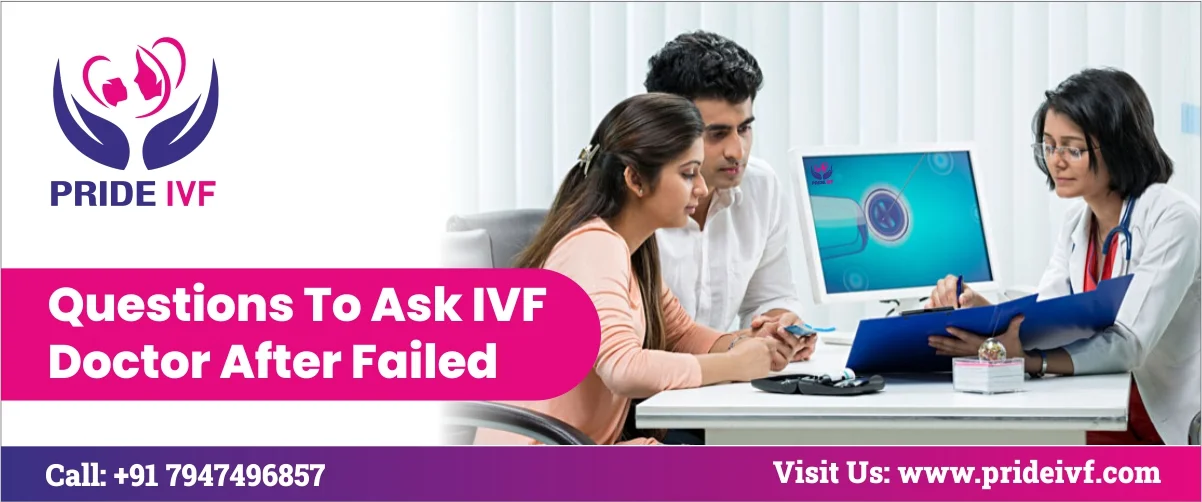Beginning the journey of in vitro fertilization (IVF) is both hopeful and daunting. Couples invest not only financially, but also emotionally in the process, with dreams of building or expanding their family. However, despite the meticulous planning and efforts, IVF cycles may not always yield the desired results. In such moments of disappointment, it is crucial to communicate effectively with your IVF doctor in delhi. There are certain questions to ask an IVF doctor after a failed cycle, it can provide clarity, insight, and perhaps most importantly, a path forward. Visit Pride IVF Centre in Delhi, where our esteemed team of top-tier doctors offer unparalleled expertise and compassionate support throughout your IVF journey.




7 Questions to Ask IVF Doctor After a Failed Cycle:
Here are 7 IVF questions you should ask your IVF doctor after a failed cycle:
Why did the IVF Cycle fail?
Determining the exact reasons behind a failed IVF cycle can be complex and multifaceted. However, several key questions can help uncover potential factors. Inquire about the quality of the embryos transferred (Also Read: Why does ivf fail with good embryo). Poor embryo quality could indicate issues with genetic abnormalities or developmental potential. Ask about the receptivity of the uterine lining and whether any factors, such as endometriosis or inflammation, might have hindered implantation. Discuss whether hormonal imbalances, such as irregularities in estrogen or progesterone levels, were addressed or monitored during the cycle. Ask your doctor IVF kya hai to get a better understanding of the process from start to finish.
You should ask your doctor whether ovarian function was optimal during stimulation, ensuring adequate egg production and quality. Also, inquire about the quality of the sperm used for fertilization and whether any male factor issues were identified. Inquire about the laboratory techniques used for embryo culture, selection, and transfer to ensure optimal conditions were maintained. Lastly, discuss whether the treatment plan was tailored to address any specific underlying issues or individual circumstances.
What could we do differently the next time?
In the aftermath of a failed IVF cycle (Also Read: Why IVF Fails?), it’s crucial to strategize for the next attempt. Collaborating closely with your IVF doctor, explore potential modifications to the treatment protocol that could enhance your chances of success. This might involve adjusting medication dosages to better suit your individual response, refining the timing of procedures to optimize conditions for fertilization and implantation, or considering additional interventions like preimplantation genetic testing to screen for chromosomal abnormalities in embryos.
Every aspect of the treatment plan can be carefully evaluated and adjusted based on your unique circumstances and any insights gained from the previous cycle. How to prepare for IVF consultation includes actively participating in the discussions and decisions, to take proactive steps toward a more favorable outcome in future IVF attempts. Remember, the journey toward parenthood often involves exploration, adaptation, and resilience, and working closely with your healthcare team can help you navigate this path with confidence and determination.
Also Read: When to Expect Period After Failed IVF?
Are there any further tests that we should consider?
Exploring additional diagnostic tests is a crucial step in understanding and addressing any underlying factors that may have contributed to the failed IVF cycle. Hormone evaluations can provide insights into hormonal imbalances that could affect ovarian function or implantation. Genetic screenings can identify any hereditary conditions or chromosomal abnormalities that may impact embryo quality or viability. Assessments of uterine health, such as hysterosalpingography or saline infusion sonography, can detect structural abnormalities, polyps, or fibroids that may interfere with implantation or pregnancy.
Proactively seeking these tests, you and your doctor can gain a comprehensive understanding of your fertility status and tailor treatment strategies accordingly. Early detection of any potential issues allows for timely interventions and adjustments to optimize the chances of success in future IVF cycles.
Lets get started
What is our chance of success in future cycles?
After experiencing a failed IVF cycle, it’s natural to seek reassurance and clarity regarding your prospects for success in future attempts. Your chances of success in subsequent cycles depend on various factors unique to your individual situation. Your doctor can provide an honest assessment based on considerations such as your age, reproductive history, and any underlying fertility issues that may impact outcomes. Advanced maternal age, for example, can decrease the likelihood of success, while certain medical conditions or lifestyle factors may also play a role.
While it’s important to approach future attempts with optimism and hope, maintaining realistic expectations is key to managing disappointment and persevering through the challenges of fertility treatment. Your doctor can offer valuable guidance and support as you navigate this journey, helping you to stay informed and empowered as you pursue your dream of building a family.
Is there any health implication if we repeat cycles?
Undergoing multiple IVF cycles can indeed have implications for both physical and emotional health. The use of fertility medications, particularly ovarian stimulation drugs, can increase the risk of side effects such as ovarian hyperstimulation syndrome (OHSS, which can cause abdominal pain, bloating, and, in severe cases, fluid accumulation in the abdomen and chest.
Frequent use of fertility medications may also heighten the risk of long-term effects on ovarian function and potentially increase the risk of certain cancers, although research in this area is ongoing and inconclusive. There are multiple stages of grief after failed ivf. Emotionally, the repeated disappointment of unsuccessful cycles can take a toll on mental well-being, leading to stress, anxiety, and depression. This is one of the questions to ask an IVF doctor, who can provide guidance on managing stress and accessing support resources such as counseling or support groups.
How long should we wait before trying again?
Following a failed IVF cycle, it’s crucial to approach the decision of when to try again with careful consideration for both physical and emotional well-being. While the desire to proceed immediately is understandable, it’s important to allow your body time to recover from the physical demands of the treatment (what happens to your body after failed ivf) and to address any emotional toll that the experience may have taken. It is one of the things you wish you knew before IVF.
Your doctor can offer guidance on the optimal timeframe for waiting between cycles based on several factors. This may include assessing your hormonal balance and ensuring that your body has sufficient time to return to its natural state before undergoing another round of treatment. In some cases, your doctor may recommend undergoing further evaluations or preparatory steps before attempting another cycle to optimize your chances of success.
What is the impact of age on IVF success?
Age plays a pivotal role in determining the success of IVF treatments. For women, advancing age correlates with declining ovarian reserve, diminished egg quality, and a higher likelihood of chromosomal abnormalities in embryos (Also Read: How Soon After Failed Frozen Embryo Transfer Can I Try Again?). As a result, pregnancy rates tend to decrease significantly after the age of 35, with a more pronounced decline after 40. Additionally, older women are at increased risk of miscarriage and pregnancy complications such as gestational diabetes and preeclampsia.
Similarly, male age can also impact IVF success, albeit to a lesser extent. Advanced paternal age has been associated with reduced sperm quality, lower sperm motility, and an increased risk of genetic abnormalities in offspring. Having an open conversation with your doctor about the implications of age on IVF outcomes is essential for setting realistic expectations and making informed decisions. Doctors charge minimal IVF consultation cost.
Conclusion:
Experiencing a failed IVF cycle can be a challenging and emotional experience, but it’s essential to approach it as a stepping stone toward future success. Effective communication with your IVF doctor is key to navigating this journey with clarity and confidence. By preparing appropriate questions to ask the IVF doctor after a failed cycle and seeking informed guidance, you can work together to assess the reasons for the failure, explore alternative strategies, and develop a tailored plan for moving forward. Remember that each individual’s fertility journey is unique, and with perseverance, patience, and the support of your healthcare team, your dreams of building a family can still become a reality.
With Pride IVF, you’ll receive the finest consultation tailored to your unique needs and aspirations. Rest assured, our commitment to excellence ensures that every step of your fertility treatment is met with professionalism and care. Choose us for the expertise you deserve and the family you’ve always dreamed of.




